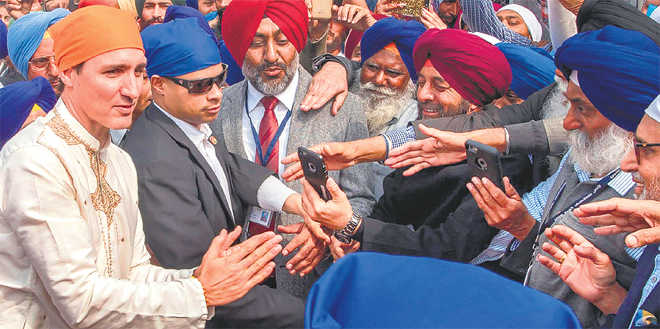Canada and India: Opposite trajectories
Pritam Singh
Professor of Economics, Oxford Brookes University, Oxford, UK
During the Canadian Prime Minister’s recent visit to India, the media in both countries, but more so in India, has tried to present as if alleged support to the demand for Khalistan by some Canadian Sikh groups and Canada’s handling of it is the main source of some perceived tension in government-to-government relations between India and Canada. There is some truth in this perception, except that it is an oversimplification and, consequently, distortion of deeper and serious differences in the political culture of Canada and India. One of the key politico-cultural differences relates to clashing perspectives on human rights. The tension over the Khalistan issue is an epi-phenomenon of the deeper structural differences on approaches towards human rights.
Economically, though Canada is a developed country and India is still a developing one, both are ruled by the logic of functioning of a capitalist economy and share many of the ills of capitalism. The massive economic inequality and its consequences - socially and culturally -point towards a shared drawback in the politico-economic governance of both countries. Within that shared universe, there are deep politico-cultural differences and one of the key ones that needs understanding if one wants to get a better grip on Canada-India relations is the difference in the perspectives on human rights in the political culture of both the countries.
Canada has a shameful and troubled history of near total annihilation of local indigenous communities and repression of non-white ethnic minorities, but a slow and tortured evolutionary path in the country has been towards acknowledging those historical injustices, making amends for them and building a more tolerant and multi-cultural society. Generations of human rights and equality campaigners have transformed through tireless struggles the political culture of the country. The father of the current Canadian PM was a key figure in building the politico-cultural consensus in Canada that a good society is one that recognises differences, values diversity and constructs institutions that facilitate the accommodation of these differences and diversities. No doubt, this consensus was a part of a wider debate mostly in Western capitalist economies that to build an efficient economy, inclusiveness of all forms of labour in the running of the economy is necessary and essential. Despite some recent retrogressions in the form of rise of racist/semi-racist political groupings and parties in some of the western countries of which the Trump presidency in the USA is most illustrative, this remains a widely accepted consensus in the western world. Canada has not only played a pivotal role in advancing this consensus but also in steadfastly remaining committed to it. Respect for human rights has become embedded in the accepted milieu of diversity and pluralism.
Theoretical and academic work on multiculturalism has been the most advanced in Canada. This work has flourished due to the culture of respect for multiculturalism, and has, in turn, further strengthened the shaping of ideas, practices and institutions in support of multiculturalism. Canada has witnessed the multifaceted benefits of this move towards multiculturalism. In the last over 20 years, Canada has either been at the top or one among the top 10 countries in the world in terms of Human Development Index. Canada can be genuinely proud that it is the only country in the western world where a non-white person (Jagmeet Singh) has become the head of a major national party in the country.
From the viewpoint of pluralism, diversity and human rights, developments in India have followed just the reverse path to the one followed in Canada. In the first half of the twentieth century, India witnessed many glorious anti-colonial struggles for expansion of human rights and freedoms. The success of the anti-colonial struggles in 1947, although marred by religious sectarianism and killings, still raised hopes of building a society based on the principle of ‘unity and diversity’. However, soon after the inauguration of the post-colonial state, the slow march towards greater emphasis on unity than diversity started. Hindu majoritarianism which was muted and disguised earlier started manifesting itself openly in various formats and has accelerated at a dizzying speed in the last 30 years or so. This majoritarianism has shifted the political discourse away from diversity and the war cry now is ‘unity and integrity’ with added emphasis on territorial integrity. In this unitarist and centralist discourse, human rights have become a suspect subject. The campaigners for human rights are projected and viewed as disloyal to the country at a lower level of suspicion and anti-national subversives at a higher level of suspicion.
If in Canada, the historical transition has been from a disgraceful past to humane and tolerant present, in India the transition has been from a historical record of anti-colonial struggles for human freedom to authoritarianism of the present juncture. Canada creates space for valuing differences for building a culturally rich society so much so that it allows one French speaking province of the country (Quebec) to hold a referendum if the province wants to secede from the union. In India, leave aside secession, even the talk of limited regional autonomy is dubbed as treason. If Canada allows free discussion on the right to secede to one of its own provinces, it is illogical to expect that it should use the coercive power of the state against some Sikhs, Kurds, Chechens, Baluchs or Tamils who advocate secession in the countries of their origin. Many members of these Canadian minorities do not even support secession, they merely want protection of the human right to assemble and debate alternative political paths. The Canadian law and political culture do not allow suppression of such peaceful articulation of differences.
An honest and informed understanding of the human rights deficit in the political culture of India especially in comparison with that of Canada can provide a road map for the possible transition India can make one day towards building a human rights rich political culture.










